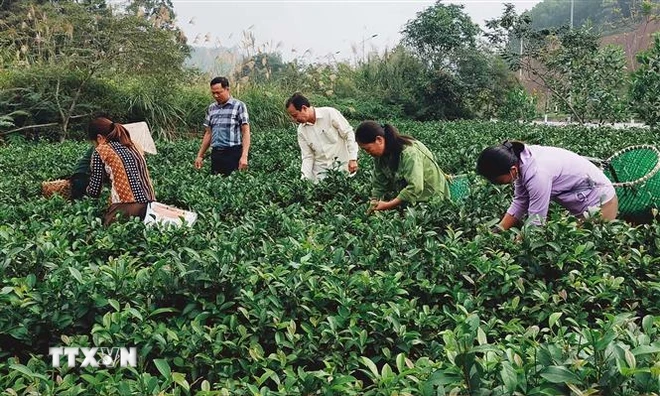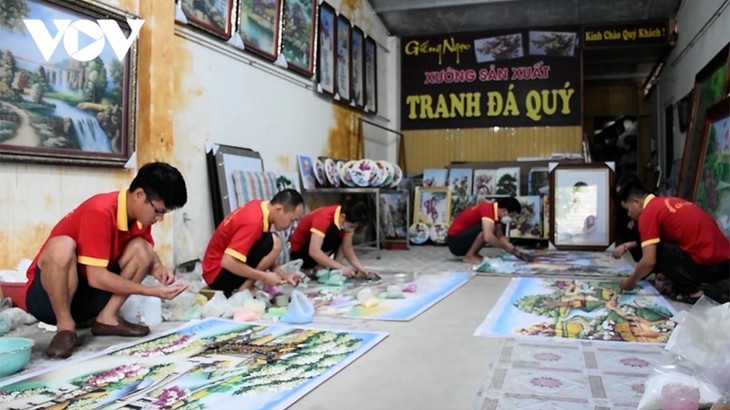(VOVWORLD) -Yen Bai province has 15 craft villages focused on processing agricultural products and handicrafts such as wood furniture, rattan and bamboo products, ceramics, textiles, and tools. The craft villages generate jobs and increase income, helping more than 70% of the communes in Yen Bai to be recognized as new-style rural places.
 People in Bao Hung commune, Tran Yen district, are harvesting Bat Tien tea. (Photo: VNA) People in Bao Hung commune, Tran Yen district, are harvesting Bat Tien tea. (Photo: VNA) |
Yen Bai province is home to more than 30 ethnic groups. Traditional crafts reflecting the local culture and lifestyle are pursued in each region by each ethnic group.
A decade after planting new Bat Tien tea varieties, Vu Ngoc Te’s family in Truc Thanh village, Tran Yen district, is reaping the fruits of their labor. He has expanded the first 720 square meters of Bat Tien tea trees to nearly 1 hectare. He now earns 7,900 USD a year. Te, who has grown tea for nearly half a century, says that delicious tea products require special attention to each stage – planting, cultivation, harvesting, and processing.
“Before the harvest, you need to mobilize sufficient manpower. You’d better ask your neighbors for help because picking the tea leaves must be done early in the morning before the sun rises. Otherwise, the tea quality will be poor. In the afternoon, we focus on processing,” said Te.
Throughout Bao Hung commune, green Bat Tien tea fields stretch across the hillsides as far as the eye can see. 300 households in the commune are growing tea on an area of 100 hectares. They are all growing new tea varieties, mainly high-quality Bat Tien tea. Bao Hung’s green tea products have been recognized as OCOP products, and are now sold domestically and exported to Europe.
Gioi Phien commune, the first certified rural village in Yen Bai city, is known for growing and processing vermicelli. 68 households are engaged in the craft. Each year they produce 400 to 450 tons of vermicelli, earning 1.3 million USD in revenue and creating jobs and stable income for hundreds of local workers.
Thanks to vermicelli production, some families have earned an income of 2,100 to 2,900 USD a year. Pham Thi Thu Ha, a member of the Gioi Phien vermicelli cooperative, said that the village has existed for a long time.
“In the past, the elders took advantage of the land along the Red River to grow arrowroot to feed livestock, then started making vermicelli,” Ha recalled, adding, “We did everything manually until 2013, when we were officially recognized as a craft village. Since then, although the number of production facilities has decreased, output has increased.”
 Luc Yen district is famous for gemstones and making gemstone paintings. Luc Yen district is famous for gemstones and making gemstone paintings. |
Yen Bai is also famous for gemstones – rubies, blue and fancy sapphires, and spinel which Luc Yen district residents turn into souvenir and décor items. The district has villages that specialize in stone crafting and carving and gemstone painting.
Nguyen Thi Ly Van, an experienced maker of gemstone paintings, said, “It requires three stages to complete a painting – choosing the stones, shaping them, and gluing them. It’s meticulous work. If you’re in a hurry, you can’t do it. If someone is creative and has an eye for aesthetics, their paintings are more beautiful.”
In the mountain province of Yen Bai, traditional crafts are part of the local ethnic culture. Nguyen Duc Dien, Deputy Director of the provincial Department of Agriculture and Rural Development, said crafts contribute significantly to local economic development. “The biggest value of craft villages is to promote local products as OCOP items. Once we link craft villages to tourism, the lives of people in rural areas will improve,” said Dien.